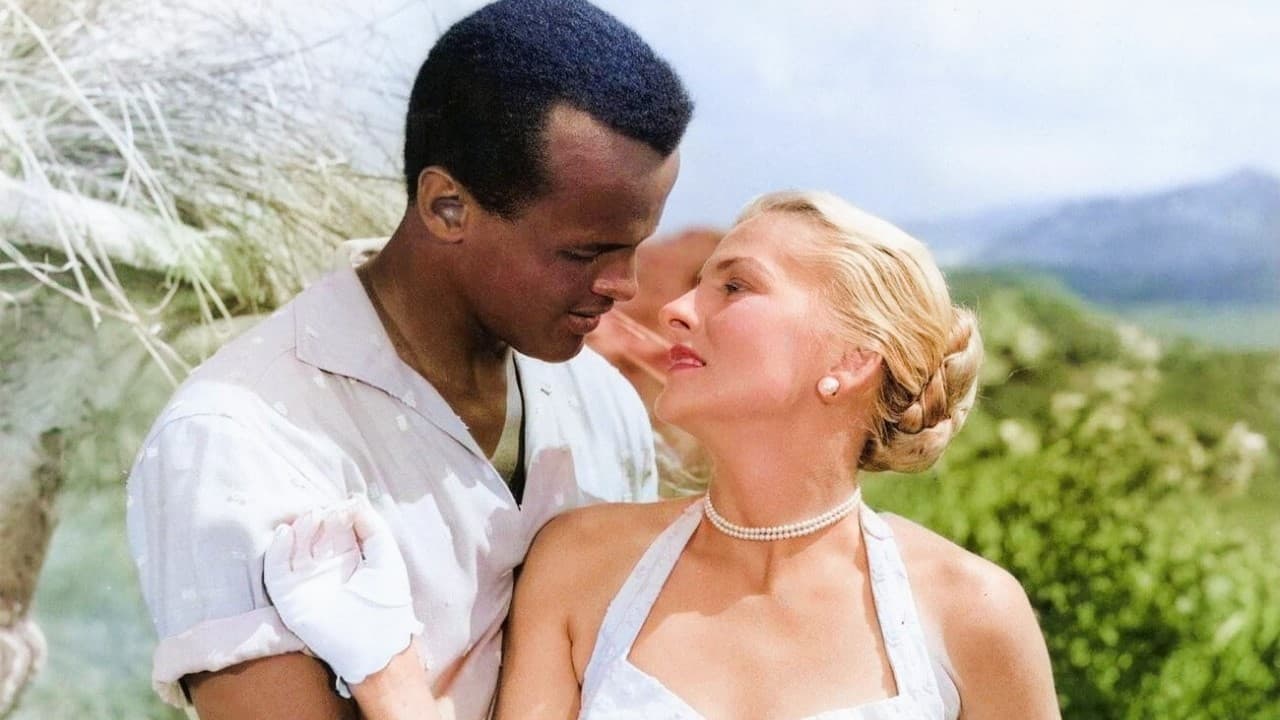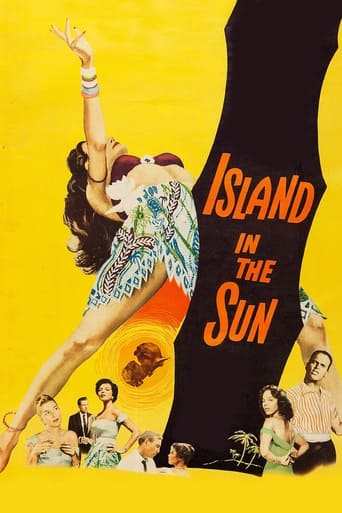

Having never read the book I can't comment on it, but it seems that the political implications of Alec Waugh's novel was largely sacrificed for the romance. Island In The Sun is a big old romance novel set in a British crown colony just as the United Kingdom was getting shed of its colonial empire. The island at one time was a part of the French empire to explain the name of Fleury as one of the island's big plantation owners. Their romantic entanglements form the basis of the novel.Basil Sydney and Diana Wynyard are the head of the Fleurys and they have two surviving children James Mason and Joan Collins. Mason is married to Patricia Owens and he suspects her of having an affair with a rather dissolute, but charming doctor Michael Rennie. Collins is kanoodling big time with Stephen Boyd the governor's son and would be peer. The governor's aide John Justin is having a fling with Dorothy Dandridge. But most shocking of all another plantation heiress Joan Fontaine is considering taking up with Harry Belafonte who sings a couple of Jamaican ballads which is always good.That interracial kiss between Belafonte and Fontaine was daring and groundbreaking and no doubt Island In The Sun had zero bookings in the American South. How silly we were back then.A story about the Fleury family reveals that Sydney's grandmother was black though I'm sure she could have passed. That sets in motion some radical reassessment of the family's status. They still have their money, but not entry into some of the best homes. Mason who has decided to stand for the local parliament with his opponent being Belafonte tries to exploit his new found black heritage with disastrous results. It ends in tragedy, but also in a strange twist happiness for one of the Fleurys as it is discovered the parents have their secrets.Harry Belafonte and James Mason stand out in this film. Belafonte has some real screen charisma. As for Mason his is a complex role of a strange man with a brooding inferiority complex that was acting out even before the news of his great grandmother.And of course the West Indies looks nice. I'm sure the original novel had more of the political situation of the time in it. Island In The Sun the movie drained most of that and we get a tropical soap opera instead.
... View More"Island in the Sun" was made in 1957, a date at which Britain still retained its colonial possessions in Africa and the West Indies, although it was clear that they were moving towards independence, following the example of India and Pakistan which had become independent in 1947. The film traces this process on the fictitious Caribbean island of Santa Marta. One of the main characters is David Boyeur, a rising young black trade union leader and politician whose radical views and popularity among the common people make him a threat to the island's traditional white ruling class.Another main character, Maxwell Fleury, is a member of that class, or would be if he were wholly white rather than of mixed race. In the course of the action Maxwell, who has always believed himself to be white, learns that he also has black ancestry. At one time a Caribbean plantation owner's son would have been horrified by such a revelation, but Maxwell, who is trying to make a career in politics, welcomes it, believing that he will be able to use his black blood as an electoral asset. His younger sister Jocelyn, however, is troubled by the news, fearing that it will ruin her budding romance with Euan Templeton, the son and heir of the island's aristocratic Governor. The film combines several interconnected plot lines. One deals with the political rivalry between David and Maxwell, another with the love of Euan and Jocelyn. Two, controversially for the fifties, deal with interracial romance. David is having an affair with Mavis Norman, the daughter of another elite white family, and Denis Archer, a young British official on the Governor's staff, has fallen in love with Margot, a local black girl. The romance between Denis and Margot ends happily, but David eventually sacrifices Mavis for the sake of his political career, breaking off the affair when he realises that marriage to a white woman, especially a woman from the island's ruling class, would prove an electoral liability and lose him votes from a predominantly black electorate. The most important plot line concerns Maxwell's private life. His marriage is an unhappy one, and he is tormented by suspicions that his wife Sylvia is having an affair. He is probably mistaken, but his jealousy becomes an obsession, leading him to confront Hilary Carson, the man whom he believes to be his wife's lover, killing him in the course of their quarrel. Much of the film deals with the police investigation of the murder.In one respect, that of age, James Mason was the wrong choice to play Maxwell. It is difficult to accept him as the brother of Joan Collins, in reality twenty-five years his junior, especially as we learn that Maxwell was not the oldest child. (He had an elder brother). It might have been better if the script had been rewritten to make Jocelyn Maxwell's niece rather than his sister. In every other respect, however, he was the right choice. Maxwell is a psychological mess. At the root of many of his problems is an inferiority complex arising from the fact that, as a boy, he was overshadowed by his brilliant older brother Arthur, and has been unable to emerge from that shadow even after Arthur's death in the war. His decision to run for office has less to do with any firm political beliefs (unlike his rival David, who has strong convictions) than with the boost to his ego that electoral success will bring him. His unfounded suspicions of Sylvia appear to derive from a lack of belief in his own manhood. Mason is excellent in portraying this complicated, troubled individual and gives a fine performance. Another good performance comes from John Williams, an actor I had not previously come across, as Colonel Whittingham, the head of the island's police force. He knows that Maxwell was responsible for killing Carson, but has no evidence to prove it, so plays complex mind-games with Maxwell in a bid to get him to confess. Dorothy Dandridge is also good as Margot, although hers is a relatively small role. This was her first film since her success in "Carmen Jones", in which she played the lead, three years earlier. Hollywood's institutionalised racism seems to have prevented this beautiful and gifted actress from achieving her full potential. Not all the acting is so good. Stephen Boyd, later to rise to fame as Charlton Heston's enemy Messala in "Ben-Hur", is particularly wooden as Euan. Harry Belafonte, who plays David, was perhaps more gifted as a singer than as an actor, and here gives an excellent rendition of the film's famous theme song. As an actor, however, he is not as good here as he was in "Carmen Jones", in which he also starred alongside Dandridge. The film's title is partly literal and partly ironic. The islands of the Caribbean are often seen by outsiders as a carefree, sunny tropical paradise, and the colour photography, concentrating on the island's natural beauty, has something of the look of a tourist travelogue. To local people, however, the islands can often seem far from paradise. Their economy was, after all, originally based on slavery, and even after its abolition many class-based and race-based tensions and inequalities remained. Meteorologically, the Caribbean may be sunny; politically and socially it can be as stormy as anywhere else on earth. It is therefore to the film's credit that it attempts to reflect some of these tensions in its storyline. Despite his shabby treatment of Mavis, the portrayal of David is generally a sympathetic one at a time when left-wing politicians were often depicted in the cinema as Communist rabble-rousers. "Island in the Sun" is interesting not only as a psychological drama but also for the picture it gives of life in a British colony in the years leading up to independence, a subject (India apart) not often treated in the mainstream cinema. 8/10
... View Moreby one of the greats in the cinematography field (Freddie Young, credited as many of his films were as F.A. Young).But isn't it amazing when you are watching a film and suddenly an actor pops up who you just know you've seen before in a similar role???? It took me awhile but just before Mason turns himself in, I figured out that John Williams also played a detective inspector (although in this film a Colonel), in Hitchcock's Dial M For Murder...typecasting? Maybe, but Williams is just so good in a role like this, you can just see how he gets the criminal to confess to the crime by slow insinuation and guilt-tripping. Mason is caught up in the trap just like Ray Milland.Apart from that small side plot, the rest is so trivially done and I'm sorry but Joan Fontaine tries just too hard with all her practised smiles to look as young as Mr. Belafonte, more an aunt or mother. Why did she do this role is beyond me.This could have been greater film if Miss Dandridge's storyline had been more developed. And Stephen Boyd (although pre-Ben Hur) is equally wasted (as he was in some other Fox films (see The Best of Everything,Fantastic Voyage). Was he really considered for Anthony in Cleopatra??? (with Joan???) That might have been fun.
... View MoreI was prompted to comment because of the previous reviewer's comments about "the hissable whites" and that "what we really want from the movie is some windswept romance and more of Belafonte." I was in my preteens when this movie came out and I saw it in the segregated South. It was the talk of the town because it was the first movie that dared show an interracial couple. It was such a controversial topic, however, that while the movie makers showed daring in matching Harry Belafonte with Joan Fontaine, they allowed them to only hug and not actually kiss. That's why there was no "windswept romance".Here it is nearly 50 years later and I just watched part of the movie Alexander with Colin Farrell and read some reviews on the movie. Several reviewers commented that while Alexander was shown often with his gay lover, the two were only allowed to hug and not to kiss. So intolerance persists--albeit with a different set of protagonists.Back to Island in the Sun: It was a ground-breaking movie and worth viewing by those who are willing to judge it by the standards of the time and not today's standards. And yes, Harry Belafonte was and still is gorgeous.
... View More